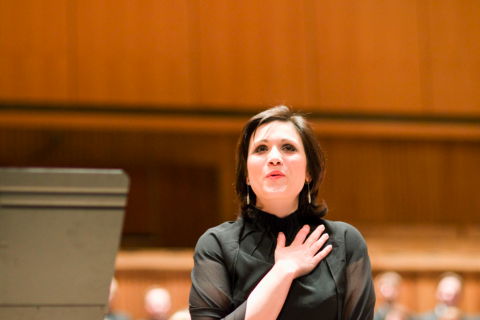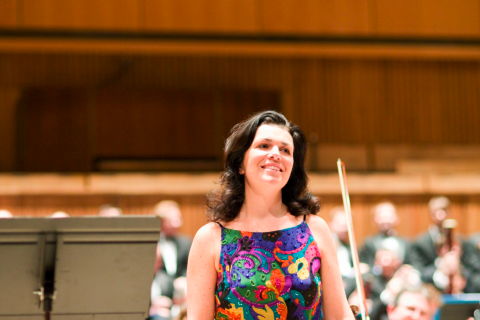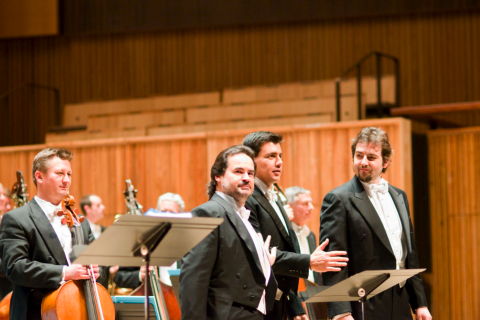|

A Masterly Account
Donizetti's 'Parisina d'Este',
heard by ROBERT HUGILL
Donizetti's Parisina d'Este was written in a tearing hurry for the Carnival season in 1833 at the Teatro dell Pergola in Florence. The libretto had been delivered very late by Felice Romani, hence Donizetti's rush to complete the opera in time. But listening to it you would not know that it's composition was rushed : it is a strong piece. Whilst there is no single scene to match the mad scene in Lucia di Lammermoor (1835), the work is of a wonderfully consistent high level of inspiration.
The first Parisina was Caroline Unger, a mezzo-soprano who had sung in the first performance of Beethoven's 9th Symphony. After she had moved to Italy she became a notable dramatic soprano. The role is very much a spinto role, requiring power and agility in combination, rather than the extremes of range needed for Lucia.
For the concert performance on 6 December 2008 at London's Royal Festival Hall, Opera Rara and the London Philharmonic Orchestra had engaged Carmen Giannattasio. She is a young Italian soprano who numbers Leonora (Il Trovatore), Desdemona, Alcina and Gluck's Orfeo ed Euridice in her repertoire, a promising combination given the needs of the role of Parisina.

Carmen Giannattasio as Parisina
|
The concert was being given in association with a recording of the opera being made by Opera Rara. They had assembled a strong young cast to support Carmen Giannattasio. Parisina's husband, Azzo, was sung by the Uruguayan baritone Dario Solari, who was in the recent Welsh National Opera Il Trovatore and will be returning there for a number of other roles. Parisina's lover, Ugo, was sung by the Spanish tenor Jose Bros, who makes this repertoire something of a speciality. Ugo's foster father Ernesto was sung by another young Italian, Nicola Ulivieri. With Parisina's lady in waiting, Imelda, sung by Ann Taylor.

Ann Taylor as Imelda
|
Parisina d'Este is not a cheerful opera. Lucia di Lammermoor, though a tragedy, gets something of a lift in performance from the coloratura display. In Parisina this display is less showy and the tone more consistently tragic. Parisina is unhappily married and in love with Ugo, and Ugo has been banished from her husband, Azzo's court. But Ugo insists on returning to see Parisina. Ugo has a bull-headed insistence on his love for Parisina and fails to see his presence puts her in an invidious position. Ugo is not the most likeable of heros : he's in love and doesn't care what trouble this causes. Luckily Jose Bros sang with a lovely lyric tenor voice. It was quite bright, narrow of focus, but flexible and of a size ideal for this repertoire. Only at the top did his voice betray him slightly, giving hints of tiredness. Bros did not succeed in making Ugo likeable, but he certainly made him convincing and musical.

Jose Bros as Ugo, Dario Solari as Azzo and Nicola Ulivieri as Ernesto
|
Solari, as Parisina's husband, opened the opera with a lovely hymn to his love for his wife. Solari demonstrated a beautiful baritone voice, with the flexibility necessary for this repertoire. Solari's voice was a real pleasure to listen to; unfortunately as the opera developed, Solari failed to bring out Azzo's irrational jealously. Solari never sounded very disturbed. In the scene in Act 2 where he observes Parisina sleeping and overhears her muttering Ugo's name, Azzo and Parisina should strike sparks off each other, but Solari sounded entirely too equable. Granted this was only a concert performance, but the other singers succeeded in creating a real dramatic atmosphere; still, given Solari's lovely voice I can't complain too much.
As Ugo's foster father, Nicola Ulivieri was rather limited in the opportunities given him by Donizetti, the character is Azzo's elderly minister so not involved romantically in the plot. Still, he does get to deliver the news at the end of Act 2 that Ugo is Azzo's son. And whenever Ulivieri got a chance to shine he did so. He is possessed of an attractive, grainy bass voice which still has the suppleness for this repertoire. I look forward to hearing him in a more major role.
In the title role Carmen Giannattasio combined power and pathos in equal measure. For much of the opera Parisina is listless and rather put upon. Even her one love scene with Ugo is highly constrained. But Giannattasio was beautifully expressive, thinning her voice where necessary but delivering with power and agility as well. In the Act 2 sleeping scene I mentioned earlier, she did succeed in striking sparks, her performance was profoundly moving.
Ann Taylor provided strong support as Imelda, though given few moments to really shine. She has an attractive warm mezzo-soprano voice, which perhaps lacked the cutting edge ideal in this repertoire.
Donizetti takes his time over the opera; Act 1 lasted eighty minutes, and Act 2 lasted over an hour. At the end of Act 2 Azzo has arrested both Ugo and Parisina and is threatening to put them both to death. Ernesto arrives with the news that Ugo is Azzo's son; cue a wonderful ensemble of substantial proportions. Donizetti seemed himself in no hurry to finish the act and produced some strong music which was certainly relished by the five soloists and conductor David Parry.
Then in Act 3, something odd happens. It is almost as if librettist Felice Romani ran out of time and completed everything as quickly as possible. Ugo is never seen again, he dies off stage killed by Azzo. Parisina receives a letter from him urging her to flee, but Azzo simply appears and tells her he has killed Ugo. There is no further mention of Ugo being Azzo's son, and certainly no scene between Ugo and Azzo like the confrontation between Ernesto and Edgardo in Lucia di Lamermoor.
But though Felice Romani might have been caught napping, Donizetti had one final trick up his sleeve. When Parisina is told by Azzo that he has killed Ugo, she responds with an aria of immense vituperation. This was a tour de force, obviously relished by Giannattasio. She had been announced as suffering from vocal fatigue, but there was little of this obvious from the way she delivered this final aria, delivering Donizetti's fireworks with vivid bravura.
The chorus was the professional group, the Geoffrey Mitchell Singers. Donizetti wrote quite a substantial chorus part with, at one point, a chorus of boat men in addition to the regular chorus. The choir sang musically and often with beauty of tone but overall they seemed a little uninvolved. Most of the soloists were notable for their dramatic fervour, which often transcended the concert format, but this did not apply to the choir.
David Parry and the London Philharmonic Orchestra produced a masterly account of Donizetti's score. Parry had total command of the genre and his speeds were apt and flexible as necessary. As often can happen in concert performance, the balance was less than ideal and in the stronger passages the sound favoured the orchestra over the singers. I could have wished that Parry had kept the LPO on a tighter rein, even though they delivered such a lovely orchestral tone. Their account of the sombre overture was especially notable.
This performance convinced, once again, that Parisina d'Este is a work of strength and power. I just hope that Opera Rara's concert (and the associated recording) will convince an opera company to take on the work.
Copyright © 9 December 2008
Robert Hugill, London UK

| 
